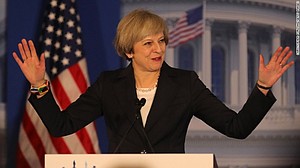2/25/2019

By Jane Merrick
(CNN) -- Taking a break from the EU-Arab League summit in Sharm el-Sheikh on Sunday evening, Theresa May was challenged to a quick game of pool by Italian PM Giuseppe Conte. It turns out her pool skills are not much better than her dance moves -- to the delight of people commenting on Twitter back in Britain.
This comic relief was short-lived, however: there is growing disbelief that, with just over a month to go before Britain leaves the European Union, May has announced a further delay on a meaningful vote on her Brexit deal. It is all getting scarily close.
That vote will now take place at the latest on March 12 -- just 17 days before Brexit is supposed to happen. Many have long-suspected that the Prime Minister is trying to run down the clock in order to force lawmakers into backing her deal, and this announcement seemed to confirm it.
Since the Brexit withdrawal agreement was struck with Brussels last November, Parliament has spent more than three months in limbo: May first delayed a major vote and then lost it spectacularly in January. Lawmakers cannot agree on a way forward. While the process has been in her hands, stalemate has ensued.
This week starts, however, with the center of power in British politics shifted away from Downing Street. The defections last week of eight opposition Labour lawmakers and three Conservatives to a new centrist movement was an extraordinarily disruptive moment. And it has emboldened those lawmakers who are staying with their parties for now to use the threat of more defections as leverage against their own leaders to get concessions on Brexit.
For May, this means she faces the very real prospect of resignations from her Cabinet this week if she fails to take a no deal Brexit off the table. At the weekend, three senior Cabinet ministers, including the Business Secretary Greg Clark, as well as Amber Rudd and David Gauke, called for a delay to Brexit unless no deal was ruled out.
The Prime Minister has used the threat of a no deal -- a scenario fiercely opposed by anti-Brexit MPs and UK businesses -- to force Parliament to back her deal. This tactic hasn't worked so far: she not only lost the meaningful vote on her deal by a margin of 230, but the Commons has also signaled its opposition to no deal.
On Wednesday, MPs will vote on a significant amendment to the Brexit legislation -- which, if passed, would give Parliament the power to take control of Brexit from the PM if no deal is agreed by March 13.
In Egypt, May is holding talks with German Chancellor Angela Merkel, European council president Donald Tusk and Irish Taoiseach Leo Varadkar in an attempt to secure concessions on the Brexit deal. But it is unlikely she will get enough to satisfy her Eurosceptic Brexiteer lawmakers, who want her to remove or put a time limit on the Northern Ireland backstop.
To make her job even harder, at the weekend Tusk said that EU leaders would not meet to green light any changes to Brexit until after the Commons has approved the Brexit deal -- so even when the meaningful vote finally takes place on March 12, the UK's future will remain uncertain. There are even reports, in the Daily Telegraph and Financial Times, that the Prime Minister is considering delaying Brexit for two months -- until May 23, the day of the European elections, to give herself more time to reach a compromise.
Yet if her strategy has been to run down the clock to force through her deal, a delay does not make sense. And, while it might seem to give the country an opportunity to pause for breath, the continuing uncertainty will only prove a headache for British businesses. Some hope, however, that a delay would allow the campaign for a second referendum to succeed -- raising the possibility that Brexit could be taken off the table completely.
When she returns to the UK, May has another tough job on her hands: to persuade her wavering ministers not to resign before the vote on Wednesday. A lot will hinge on her Commons statement on Tuesday, opening the latest round of parliamentary discussions on Brexit. She needs to persuade her lawmakers that she is doing enough to avoid a no deal -- while also requesting changes from Brussels to keep the Brexiteers happy. Suddenly playing pool doesn't seem that hard at all.
